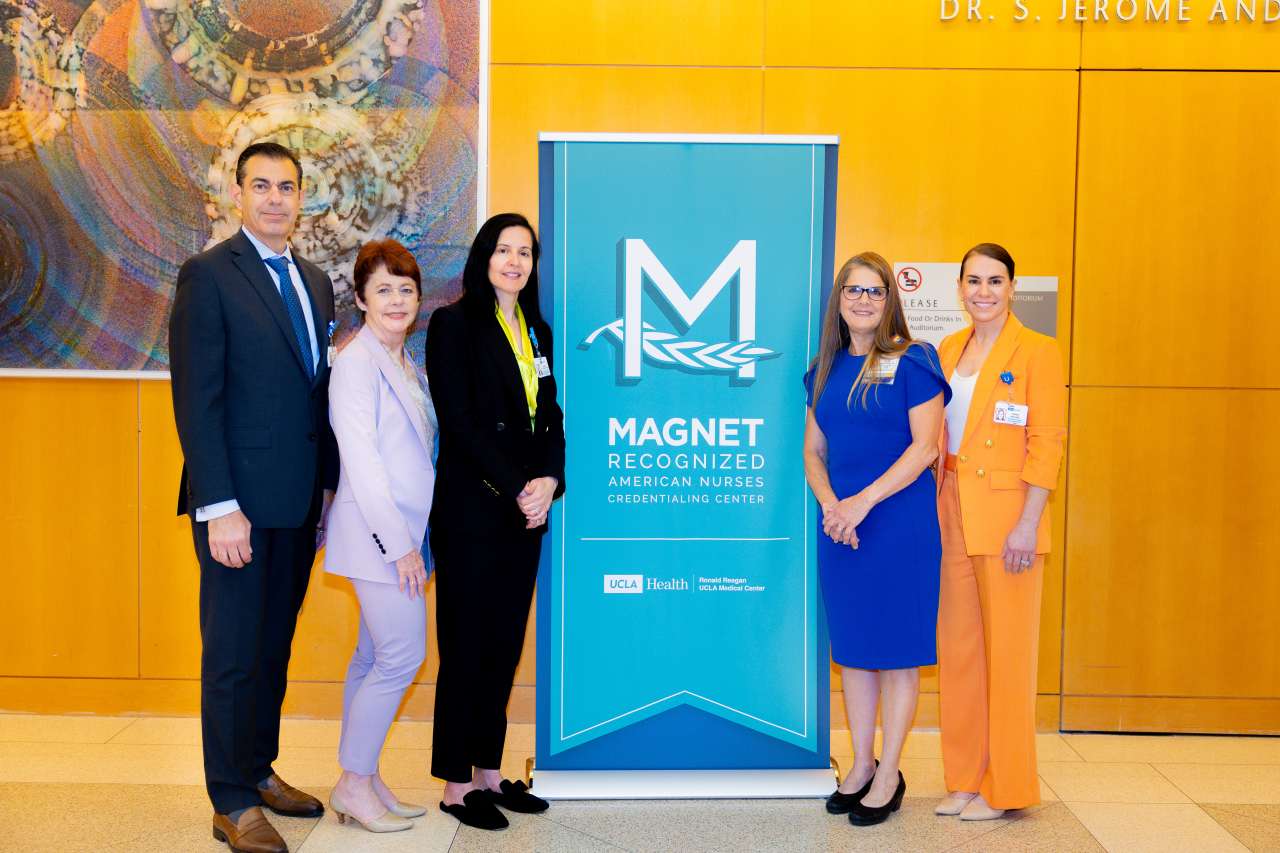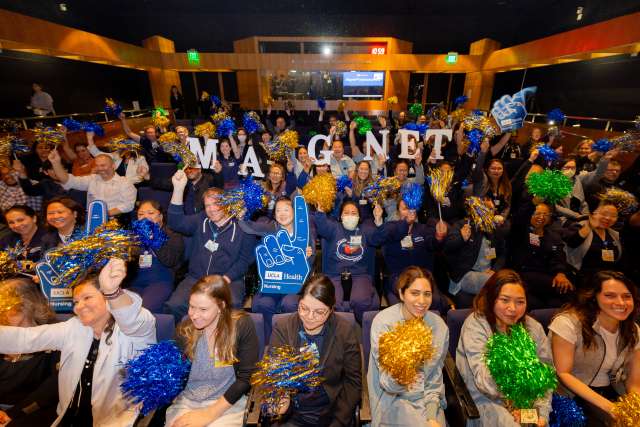Ronald Reagan UCLA Medical Center has achieved its fifth consecutive Magnet® designation from the American Nurses Credentialing Center (ANCC). Magnet® is considered the gold standard for nursing excellence; as of 2025, fewer than 10% of health care organizations out of nearly 6,100 nationwide are recognized with the designation.
This latest recognition places the medical center in an elite group: Only about 17% of Magnet®-designated organizations have achieved a fifth designation or more — representing less than 2% of all U.S. hospitals.
“This fifth Magnet® designation is powerful confirmation of our deep and sustained commitment to nursing excellence,” says Chief Nursing Executive Karen Grimley, PhD, MBA, RN, NEA-BC, FACHE, FAAN. “It reflects how strongly this organization supports professional nursing practice — not just in words, but in action.”
Dr. Grimley adds that not only are nurses practicing at the highest level of their profession, but they are also discovering best practices and modeling them for health systems nationwide.
“We’re honing our skills and developing evidence that support changes in nursing practice that further our profession and also enhance our ability to improve the safety and quality of patient care,” says Dr. Grimley, who is also assistant dean of the UCLA School of Nursing.
Better outcomes, greater satisfaction
Studies have shown that Magnet® -designated hospitals have better patient outcomes, lower mortality and infection rates, increased patient safety and higher patient satisfaction rates, says Jessica Phillips, PhD, MSN, RN, NPD-BC, executive director of nursing practice, education and research and the Magnet® program director for the Center for Nursing Excellence at UCLA Health.
Magnet® recognition also helps hospitals attract highly qualified nurses, which results in higher retention, increased nursing engagement scores, and greater opportunities for professional development, Dr. Phillips says.
“Magnet® culture promotes the voice of the nurse being strong in the organization, and it signifies the strength in interprofessional relationships within the organization,” she says. “It moves beyond just nursing to how we deliver care collectively as an organization. It also helps organizations create healthy work environments where nurses can thrive and be leaders.”
Although the designation is conferred every four years, the work never stops, says Kateri Tobias, MSN, RN, former nursing practice outcomes and Magnet® program coordinator.
“Magnet® organizations are pushing the boundaries, advancing nursing care,” Tobias says. “Others look to us to set the standard — and that responsibility isn’t tied to a four-year cycle. It’s something we live out every day through a continuous drive to raise the bar.”
Highlighting exemplary work
Organizations seeking Magnet® redesignation must provide interim reports proving they continue to meet or exceed Magnet® standards, with a majority of units outperforming national benchmarks for the past eight quarters. They must reapply for Magnet® designation every four years, culminating in a rigorous, three-day on-site visit by ANCC Magnet® appraisers.
During the recent site visit, appraisers interacted with more than 570 nurses and other team members across the organization and learned about several highly valued programs that support clinical nurse practice.

In its report, the appraiser team highlighted several areas of exemplary practice including, under the category of transformational leadership, A Safer U, an organizational workplace safety initiative spearheaded by Dr. Grimley. The initiative stood out for its broad reach — shaping institutional policies, involving interdisciplinary teams, and strengthening a culture of safety across departments.
Under the category of exemplary professional practice, the appraisers recognized the strength of clinical nurses in driving practice improvements through robust professional governance and shared decision-making. They observed that every RRUCLA unit and department maintains an active Unit Practice Council (UPC), with annual performance incentive goals aligned to the UCLA Health Nursing strategic plan. What distinguished this model was the meaningful integration of evidence-based practice (EBP) initiatives that directly inform and advance nursing practice.
In addition, the appraisers praised the work of several EBP projects presented at a UPC Summit, including:
"Share a LEAF": A multi-modal fall prevention initiative using enhanced visual cues and patient/family education, leading to a reduction in falls. Introduced on 6 West (Medical-Surgical Specialty Unit).
Fast-track Extubation Protocol: Sustained early extubation success for CABG (Coronary Artery Bypass Grafting)/Valve Surgery patients, improving outcomes and reducing ICU length of stay. Piloted in 7ICU (Cardiothoracic Intensive Care Unit).
Fall Reduction Strategies: Focused on education and purposeful rounding, leading to decreased fall rates in hospitalized adult liver patients. Implemented on 8 North (Liver Transplant Unit).
Safe Patient Handling Initiative: A unit-driven injury prevention effort promoting safe patient movement practices for staff safety. Launched on 7 West (Cardiac & Thoracic Surgery Unit).
Shared governance a key
Magnet® culture at UCLA Health is grounded in the three-pronged relationship-based care model (patients, colleagues and self) and a robust professional governance model in which each of the five councils aligns with an element of the Magnet® model.
In addition, Dr. Grimley has set a 51% staff nurse requirement for all councils, with staff nurses chairing the Nurse Executive Council.
“It’s a model that supports the voice of the nurse closest to the patient. And that's the secret. You want a grassroots organization for nursing because the closer we are around decision-making to the patient, the more holistic and thoughtful our decisions usually are,” says Dr. Grimley, who notes that her primary inspiration comes from the bedside.
"The innovation, creativity and dedication our nurses bring to their work every day shape the future of care, and that impact should be recognized,” Dr. Grimley says. “Magnet® provides a powerful platform to highlight their contributions and the excellence they bring to patient care. This recognition is not only earned through their hard work — it reflects who they are and the deep commitment they have to the patients and the families they care for.”





